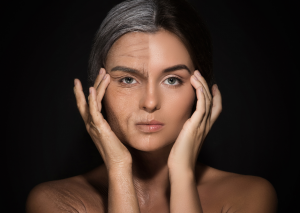What is Menopause in TCM?
 Menopause signifies a natural transition in a woman’s life, typically occurring between the ages of 45 and 55, where ovarian hormone production declines, leading to the cessation of menstrual periods and various physical and emotional changes. In Traditional Chinese Medicine (TCM), menopause is viewed as a pivotal phase characterized by shifts in Yin and Yang energies, as well as disruptions in Qi and Blood flow. While TCM recognizes menopause as a normal life stage, it also acknowledges that imbalances in these energies can exacerbate menopausal symptoms.
Menopause signifies a natural transition in a woman’s life, typically occurring between the ages of 45 and 55, where ovarian hormone production declines, leading to the cessation of menstrual periods and various physical and emotional changes. In Traditional Chinese Medicine (TCM), menopause is viewed as a pivotal phase characterized by shifts in Yin and Yang energies, as well as disruptions in Qi and Blood flow. While TCM recognizes menopause as a normal life stage, it also acknowledges that imbalances in these energies can exacerbate menopausal symptoms.
Acupuncture and TCM herbs offer holistic approaches to managing menopausal symptoms and supporting overall well-being during this transition. By targeting acupoints associated with symptoms like hot flashes, night sweats, insomnia, mood swings, and vaginal dryness, acupuncture can provide relief and facilitate a smoother transition through menopause.
TCM herbs are tailored to individual patterns of disharmony and may include a blend of herbs known for their ability to nourish Yin, clear heat, tonify Qi and Blood, and regulate hormonal balance. These herbs work synergistically to alleviate symptoms and promote overall health and vitality during this life stage.
Causes of Menopause
Menopause, viewed through the lens of TCM, is influenced by both natural physiological changes and imbalances in the body’s Qi, Blood, Yin, and Yang energies. While menopause is a natural process, several factors can influence its severity and experience:
- Decline in Ovarian Function: The primary trigger for menopause is the natural decline in ovarian function, leading to reduced production of estrogen and progesterone hormones. This hormonal shift disrupts the balance of Yin and Yang energies in the body, contributing to menopausal symptoms.
- Age: Aging is closely associated with menopause, typically occurring between the ages of 45 and 55. As women age, ovarian function gradually declines, resulting in the cessation of menstrual periods and the onset of menopause.
- Genetic Factors: Genetic predispositions can impact the timing and experience of menopause. Women with a family history of early menopause may undergo this transition at a younger age due to genetic influences.
- Lifestyle Factors: Certain lifestyle habits, including smoking, excessive alcohol consumption, poor diet, and high stress levels, can disrupt hormonal balance and worsen menopausal symptoms. These lifestyle factors can contribute to imbalances in Qi, Blood, Yin, and Yang energies, affecting overall health during menopause.
- Emotional Factors: Emotional stress, unresolved emotions, and mental health issues can exacerbate menopausal symptoms. Emotional imbalances disrupt Qi flow and affect the equilibrium of Yin and Yang energies, leading to symptoms such as hot flashes, insomnia, and mood swings.
What self-care Method Can Help Menopause?
- Healthy Diet: Eating a balanced diet rich in fruits, vegetables, whole grains, and lean proteins supports hormonal balance and reduces menopausal symptoms. Avoiding processed foods, caffeine, alcohol, and spicy foods can help minimize hot flashes and mood swings.
- Regular Exercise: Engaging in regular physical activity like walking, yoga, or swimming helps reduce stress, improve mood, and promote overall well-being. Exercise also supports bone health, reducing the risk of osteoporosis.
- Stress Management: Practicing stress-reduction techniques such as meditation, deep breathing, or mindfulness helps alleviate anxiety, mood swings, and sleep disturbances common during menopause.
- Adequate Sleep: Prioritizing sufficient sleep is crucial for managing menopausal symptoms like insomnia and fatigue. Establishing a bedtime routine and creating a comfortable sleep environment promote restful sleep.
- Hydration: Staying hydrated supports overall health during menopause, alleviating symptoms like dry skin, vaginal dryness, and hot flashes.
- Herbal Remedies: Incorporating TCM herbs into your routine can regulate hormonal balance and alleviate menopausal symptoms.
- Acupuncture: Regular acupuncture sessions regulate Qi flow, restore energy balance, and alleviate symptoms such as hot flashes, night sweats, and mood swings.
- Mind-Body Practices: Yoga, tai chi, qigong, or guided imagery reduces stress, improves mood, and promotes emotional well-being during menopause.
How Can We Help?
At Happipuncture, we offer personalized holistic treatments to address the unique needs of individuals experiencing menopause. Our goal is to support you through the menopausal transition with compassion and effectiveness. Contact us to learn more about our services.




